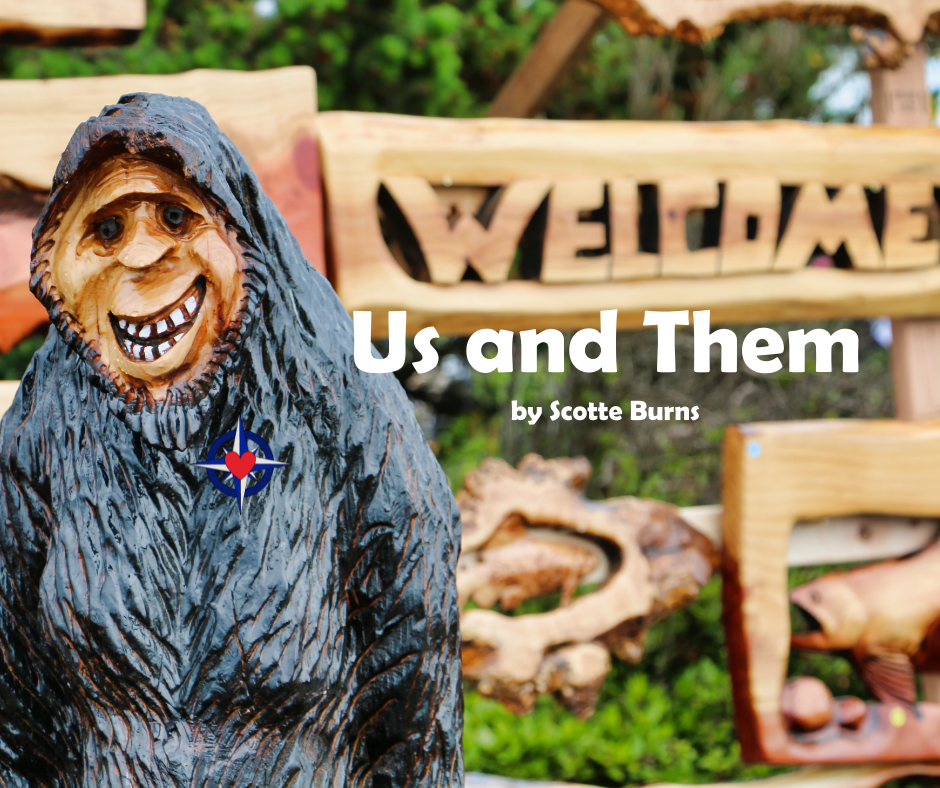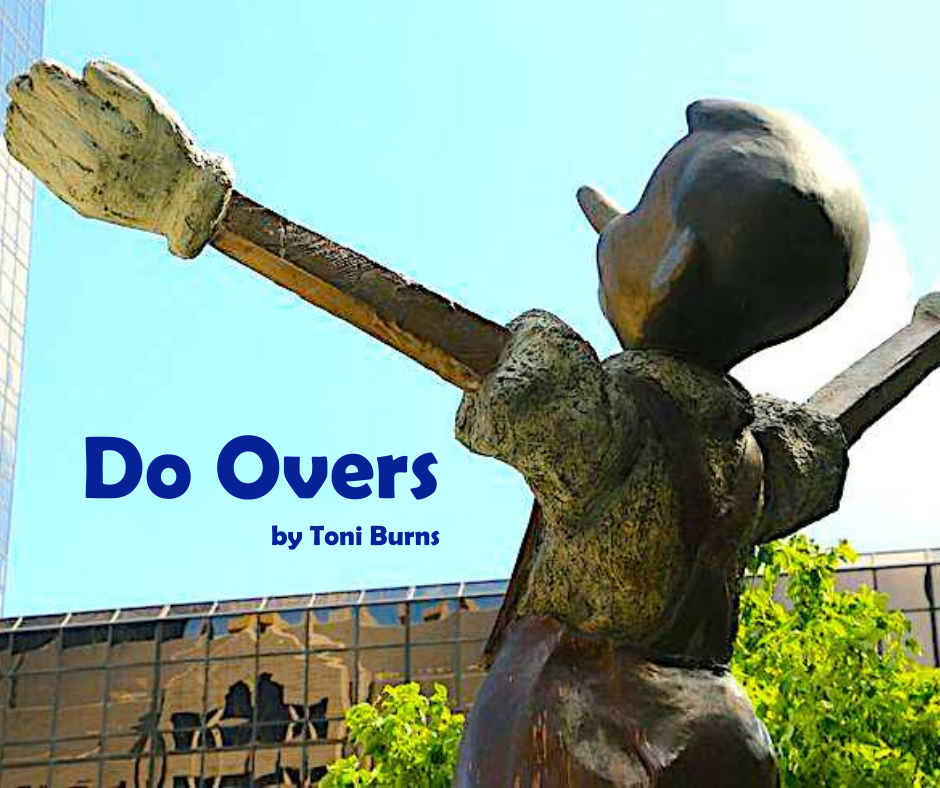Us and Them
- Scotte Burns

- Feb 13, 2024
- 6 min read
Updated: Feb 22, 2024
Like so many Americans, Toni and I struggle to fathom events in the news, and we lament the ongoing resurgence of class and racial tensions in our country. On the road for Journeys to Love, we are blessed to meet people from every corner and culture in our country as individuals, and acceptance of one another is easy; the exchanges are human and inspiring. And yet, the clash of tribes in the wider world continues and seems to worsen daily. It’s easy to blame politicians, institutions, or factions for this, and many of them certainly have a hand in it all. Yet, even though it will take some time, all their machinations, failings, suspicions, and soullessness will only continue to bend the arc of the universe toward love and justice because obeying the Law of Unintended Consequences, today’s challenges offer tomorrow’s unforeseen rewards. In other words, there is hope.
Consider: change is the natural condition of existence, which is as true in the physics of the universe as it is within individual human lives. As we revisit our personal histories over time, we see that our judgments and perceptions of people and events inevitably evolve. Opinions on the appropriateness of nudity in art, acceptance of the heliocentric/round Earth model, the relative quality of craft beers, what words are profane, man buns and mullets - our social, aesthetic, and moral perceptions of these things have changed over time, and will continue to do so. Things evolve in and of themselves as well - the objects themselves change. Living things undergo life stages, continents drift, and music and art creatively develop. And demonstrating that change does not necessarily mean advancement, technology can build upon itself or become abandoned at different times and places. Either represents change. Whether it is our perceptions or the things that we perceive, however, change remains inevitable.
And that’s going to piss some people off every time.
Because no matter the present state of things, some folks will prefer that static state so long as its conditions either favor them, agree with their concepts of how things should be, or are at least comfortable and predictable (which are often the same thing.) And if conditions change too slowly to perceive over the course of a lifetime or two, say over several generations or more, many folks will begin to see those conditions as the way things have always been and the way they should always be. But again, existence doesn’t work that way; our lives and world are inexorably dynamic. And today, the forces of change aren’t slowly evolving. They are accelerating, and the literal face of our nation is changing.
Within our lifetimes, America will have no racial or ethnic minority per se. Pew Research and the DHS show that immigration from Mexico is declining, while that from Central America and Asia are rapidly increasing, as is that from the Middle East. As Boomers exit the stage, aging GenXers and Millennials have become the dominant generations, bringing with them more diverse and secular politics that don’t identify with either currently existing major party. But GenZ is right behind and represents different social and political sensibilities from both of their predecessors. Genomics, nanomedicine, individualized AI health care, and other medical technologies are advancing at a dizzying rate, making the elimination of most diseases possible and 130-year lifespans the norm, not sometime in the distant future, but within a few years. This will mean the end of every previous expectation of a linear lifespan in which we simply expect everyone to be born, go to school, get a job, retire, and die on schedule. The death thing will remain a relative certainty (though digital immortality is on the horizon), but until then, today’s Americans will have explored several careers, gone to school differently and multiple times, and will have dismissed the traditional concept of retirement. Financial planning will never be the same, but then money as we currently think of it will likely be crypto-blockchained into the dustbin of history as well. Family structures, perspectives on gender, the size and definition of the middle class, what it means to be old, how we eat and farm, and religious affiliations are all changing, accelerated by deliberately self-evolving technologies like quantum computing, gene editing, and very soon, artificial general intelligence.
As our population continually evolves and the nature of life in America fundamentally changes, an evolution in our perceptions of our foundational histories also inexorably unfolds. We’ve rightly come to see that Manifest Destiny harbored some brutal conceits and that our founders’ assumptions hinged on a more nuanced concept than we were told as children - that all white male landowners were created equal. But although our judgments of the men involved will shift over time, and their adherence to them was far from absolute, the core principles they espoused retain their integrity. Truth is still that which is in accordance with fact and reality, duty remains our moral obligation to act according to conscience, and freedom is the natural state of humankind - a thing granted by our Creator, not through human decree, government, or law.
Acknowledging their shortcomings in uniformly honoring these principles is not a condemnation of our founders. They, like all of us today, were flawed products of their times, environments, and experiences. Their triumphs still benefit us, and from their mistakes (and our own), we can learn to build a better America for posterity. An unvarnished view of our founders, our country, and our moral connections to them both, offers profound hope for our country’s future. In a willingness to examine and address our faults as our faces and hues change, America can still be the place that ultimately shows how our ideals of liberty and humanity are universal among all human beings; they have nothing at all to do with color, ethnicity, age, or gender. Honoring this self-evident truth, we can rebuild a nation based on the principles and love we have in common, the desire for which is why so many have come here in the first place, to join in that common hope.
With change, however, come the familiar historical challenges and threats from intractable forces that have most benefited from the previous order. We see this in the hate marches, insurrections, and violence of recent years. The better angels of America’s past and present must be our guide through these struggles. The ideals of natural rights, equal opportunity, civic duty, and a social compact to protect even the views of those with whom we disagree - all the things codified in our Constitution and Bill of Rights by those great and deeply flawed men - remain the last, best hope for humanity.
For this, we will need more than our founder’s intellectual greatness. We will need to learn to love one another - not in a Pollyanna chorus of "kumbaya," that squishy sentiment that Martin Luther King called “emotional bosh.” But in the kind of transcendent, patient, humbly foot-washing, unyielding love that can move mountains, especially majestic purple ones. Love is the irresistible force demanding that there must never be an us and them - as humans or as Americans. No matter the hue of our faces or the cut of our clothes, there can be only us. We often hear and wield the term "American exceptionalism." But what should make us truly exceptional is not that we believe ourselves better than others, but that we never look at another human being and say, “Everyone is welcome at our table...except you.” As Dr. King, a man who knew something about both love and hate, told us, “Returning hate for hate multiplies hate, adding deeper darkness to a night already devoid of stars. Darkness cannot drive out darkness; only light can do that. Hate cannot drive out hate, only love can do that.”
Loving those who hate us is hard, yes, but we’re a nation built on audacity and courage and faith. Dammit, we do the hard stuff! Always have.
Some of our people are frightened by the changes America is undergoing; they feel displaced within the land of their birth and legacy. While defending the principles and plurality of our country, we must also offer our fellow citizens who feel this way our understanding and compassion, not our scorn. And to those who come here willing to work, create, and belong, hoping for the freedom and promise that we who were gifted it too often take for granted, we must live up to the responsibility of having proclaimed for over two centuries, "E Pluribus Unum," or, "Out of Many, One." Such a promise is uniquely American and demands that we love and include fellow citizens who feel threatened by the changes and challenges we face, just as we seek to welcome and bond with those who yearn to breathe free in this place we’ve struggled to build together.
Because once we learn to do that, there can be no more them, only us. Americans.
“We are not enemies but friends. We must not be enemies. Though passion may have strained, it must not break our bonds of affection. The mystic chords of memory will swell when again touched, as surely they will be, by the better angels of our nature.” - Abraham Lincoln





Comments